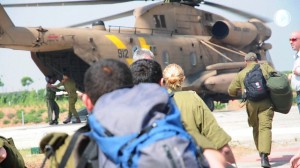
By Marney Blom
Beyond Israel’s sprawling Golan Heights and northeastern border weaves a strip of territory known as no man’s land. It is the disengagement zone between Israel and Syria created in 1974 after the Yom Kippur war. This land belt, ranging from 200 meters to 10 kilometres wide, became a buffer between the two nations and the ceasefire lines that were to be closely monitored by the UN.
On the Israeli side Syrian war relics still abound. An old Syrian army barrack and the ghost of a once bustling Syrian hospital are now silent bystanders of the modern Syrian war being waged not many meters away. While I explored the area, an Israeli Defence Force (IDF) army vehicle suddenly appeared ahead. As Syrian fighting creeps closer to Israel – even spilling over into no man’s land – these soldiers keep a watchful eye on the Israeli border.
The Syria-Israel no man’s land also serves as the unlikely gateway through which injured Syrians find much needed, even life saving medical help. Although the two nations are officially at war, the IDF regularly treats injured Syrians – both civilians and soldiers – often risking their own safety to do so.
“I am a paramedic. My job is to take care of people and to help them. I will take care of the Syrian as much as I will take care of the soldiers in Israel,” said Noga Erez, a 20-year-old paramedic based 15 kilometres from the Syrian border . “It doesn’t matter what is the situation between Israel and Syria,” said the young warrior who recently received the President’s Award for Excellence for her outstanding service in the IDF.
Erez is never without her M16 rifle as her life is in danger every time she goes to rescue the injured. “I have my gun with me all the time because … we’re taking care at the border and it is really dangerous and we need to protect ourself.”
In February 2013, as the need continued to escalate, the IDF built a field hospital close to the Syrian border for the sole purpose of treating wounded Syrians. To date this medical facility has treated over 1000 Syrians – the identifies of which remain confidential, so as not to jeopardize their safety when return to Syria.
Their work and conviction is a living illustration of the medical corps oath which states, “I will always be my brother’s keeper” – a stark contrast to the killing fields in Syria only 100’s of meters away.
Like Erez, whose life is in danger every time she goes to rescue an injured Syrian, the IDF and civilian staff at the hospital work daily within harm’s way.
“I never really felt in danger that someone will kill me or hurt me,” admitted Erez, a gentle fair-haired young IDF soldier. “[But] it is on the border and [the Syrians] are not really our best friends. It is dangerous but it doesn’t matter.
Marney Blom is news director for the Acts News Network.
Copyright 2014 © Acts News Network, Inc.
